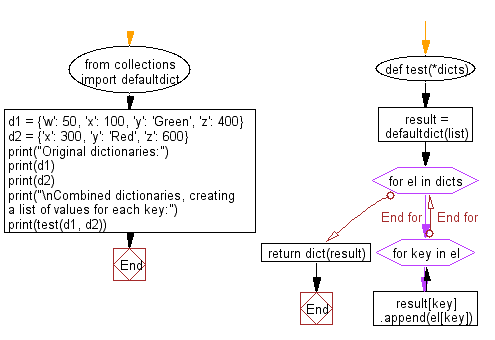Python: Combine two or more dictionaries, creating a list of values for each key
68. Combine Dictionaries Creating List of Values per Key
Write a Python program to combine two or more dictionaries, creating a list of values for each key.
- Create a new collections.defaultdict with list as the default value for each key and loop over dicts.
- Use dict.append() to map the values of the dictionary to keys.
- Use dict() to convert the collections.defaultdict to a regular dictionary.
Sample Solution:
Python Code:
# Import the 'defaultdict' class from the 'collections' module.
from collections import defaultdict
# Define a function 'test' that takes any number of dictionaries as arguments (*dicts).
def test(*dicts):
# Create a 'defaultdict' object 'result' with a default value of an empty list.
result = defaultdict(list)
# Iterate through the dictionaries passed as arguments.
for el in dicts:
# Iterate through the keys and values in each dictionary.
for key in el:
# Append the value associated with the 'key' to the list for that 'key' in 'result'.
result[key].append(el[key])
# Convert the 'defaultdict' 'result' back to a regular dictionary and return it.
return dict(result)
# Define two dictionaries 'd1' and 'd2' with key-value pairs.
d1 = {'w': 50, 'x': 100, 'y': 'Green', 'z': 400}
d2 = {'x': 300, 'y': 'Red', 'z': 600}
# Print the original dictionaries.
print("Original dictionaries:")
print(d1)
print(d2)
# Call the 'test' function with 'd1' and 'd2' and print the combined dictionary.
print("\nCombined dictionaries, creating a list of values for each key:")
print(test(d1, d2))
Sample Output:
Original dictionaries:
{'w': 50, 'x': 100, 'y': 'Green', 'z': 400}
{'x': 300, 'y': 'Red', 'z': 600}
Combined dictionaries, creating a list of values for each key:
{'w': [50], 'x': [100, 300], 'y': ['Green', 'Red'], 'z': [400, 600]}
Flowchart:

For more Practice: Solve these Related Problems:
- Write a Python program to merge two dictionaries so that each key maps to a list of values from both dictionaries using defaultdict.
- Write a Python program to combine multiple dictionaries into one by appending values for duplicate keys into lists.
- Write a Python program to iterate over multiple dictionaries and construct a new dictionary where each key’s value is a list of all corresponding values.
- Write a Python program to implement a function that takes several dictionaries and returns a combined dictionary with keys mapping to lists of values.
Go to:
Previous: Write a Python program to invert a given dictionary with non-unique hashable values.
Next: Write a Python program to group the elements of a given list based on the given function.
Python Code Editor:
What is the difficulty level of this exercise?
Test your Programming skills with w3resource's quiz.
